Como importar vários arquivos de texto de uma pasta para uma planilha?
Por exemplo, você tem uma pasta com vários arquivos de texto e deseja importá-los para uma única planilha, conforme mostrado na captura de tela abaixo. Em vez de copiar os arquivos de texto um por um, existem truques para importar rapidamente os arquivos de texto de uma pasta para uma planilha?
Importar vários arquivos de texto de uma pasta para uma única planilha com VBA
Importar arquivo de texto para a célula ativa com Kutools para Excel ![]()
Importar vários arquivos de texto de uma pasta para uma única planilha com VBA
Aqui está um código VBA que pode ajudá-lo a importar todos os arquivos de texto de uma pasta específica para uma nova planilha.
1. Ative a pasta de trabalho onde deseja importar os arquivos de texto e pressione as teclas Alt + F11 para abrir a janela do Microsoft Visual Basic for Applications.
2. Clique em Inserir > Módulo, copie e cole o código VBA abaixo na janela do Módulo.
VBA: Importar vários arquivos de texto de uma pasta para uma planilha
Sub Test()
'UpdatebyExtendoffice6/7/2016
Dim xWb As Workbook
Dim xToBook As Workbook
Dim xStrPath As String
Dim xFileDialog As FileDialog
Dim xFile As String
Dim xFiles As New Collection
Dim I As Long
Set xFileDialog = Application.FileDialog(msoFileDialogFolderPicker)
xFileDialog.AllowMultiSelect = False
xFileDialog.Title = "Select a folder [Kutools for Excel]"
If xFileDialog.Show = -1 Then
xStrPath = xFileDialog.SelectedItems(1)
End If
If xStrPath = "" Then Exit Sub
If Right(xStrPath, 1) <> "\" Then xStrPath = xStrPath & "\"
xFile = Dir(xStrPath & "*.txt")
If xFile = "" Then
MsgBox "No files found", vbInformation, "Kutools for Excel"
Exit Sub
End If
Do While xFile <> ""
xFiles.Add xFile, xFile
xFile = Dir()
Loop
Set xToBook = ThisWorkbook
If xFiles.Count > 0 Then
For I = 1 To xFiles.Count
Set xWb = Workbooks.Open(xStrPath & xFiles.Item(I))
xWb.Worksheets(1).Copy after:=xToBook.Sheets(xToBook.Sheets.Count)
On Error Resume Next
ActiveSheet.Name = xWb.Name
On Error GoTo 0
xWb.Close False
Next
End If
End Sub3. Pressione F5 para exibir uma caixa de diálogo e selecione a pasta que contém os arquivos de texto que deseja importar. Veja a captura de tela: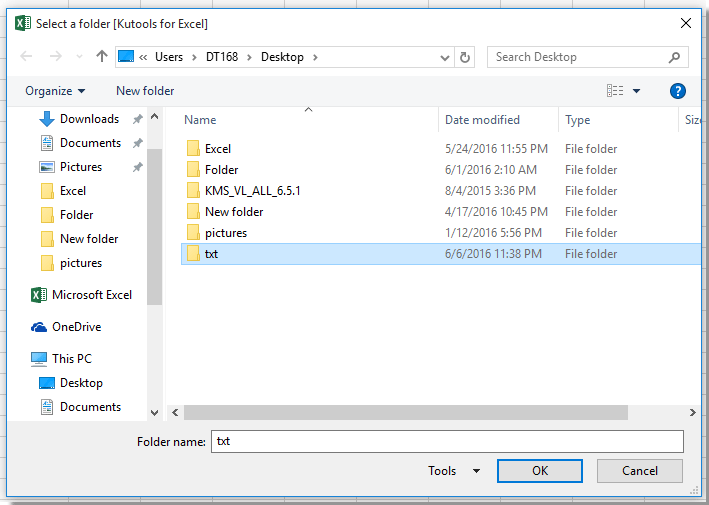
4. Clique OK. Em seguida, os arquivos de texto serão importados para a pasta de trabalho ativa como novas planilhas separadamente.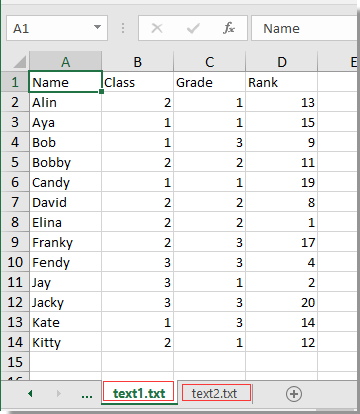
Importar arquivo de texto para a célula ativa com Kutools para Excel
Se você quiser importar um arquivo de texto para uma célula ou intervalo específico, pode usar o utilitário Inserir Arquivo na Célula do Kutools para Excel.
Após instalar gratuitamente o Kutools para Excel, siga os passos abaixo:
1. Selecione uma célula onde deseja importar o arquivo de texto e clique em Kutools Plus > Importar/ Exportar > Inserir Arquivo na Célula. Veja a captura de tela: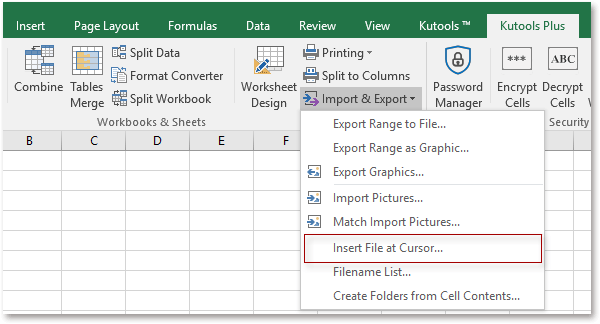
2. Uma caixa de diálogo será exibida, clique em Procurar para exibir a Selecionar um arquivo para ser inserido na posição do cursor da célula, em seguida, selecione Arquivos de Texto na lista suspensa e escolha o arquivo de texto que deseja importar. Veja a captura de tela: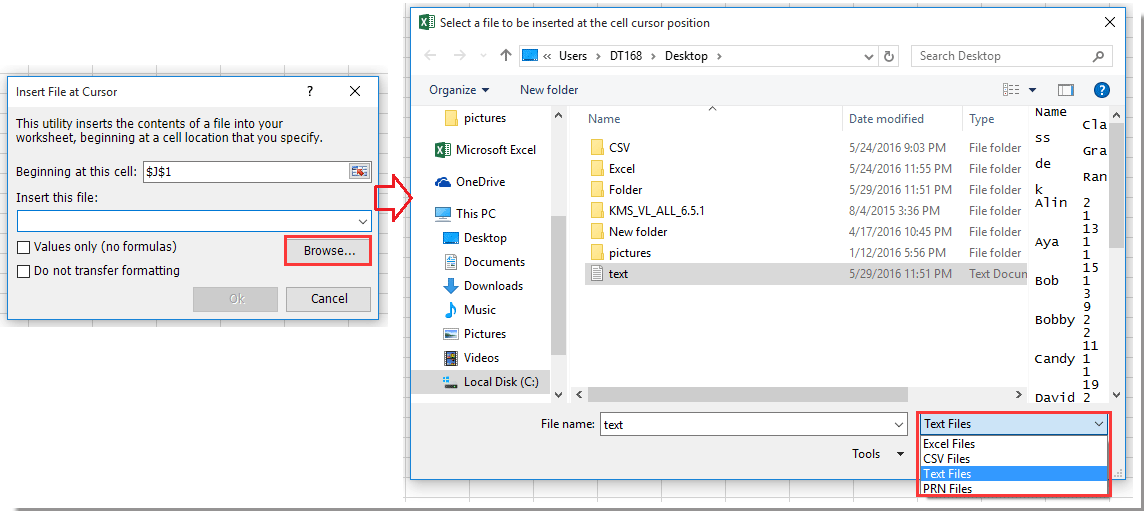
3. Clique em Abrir > Ok, e o arquivo de texto especificado será inserido na posição do cursor, veja a captura de tela: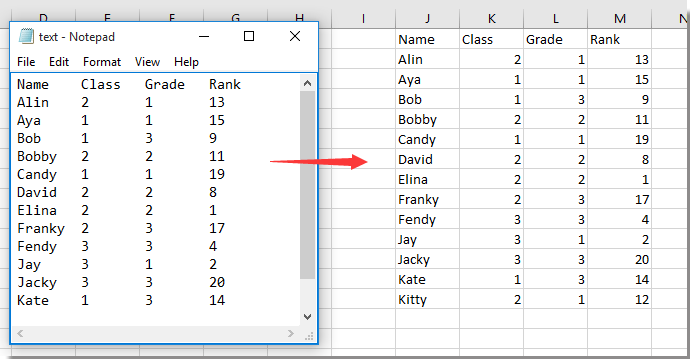
Melhores Ferramentas de Produtividade para Office
Impulsione suas habilidades no Excel com Kutools para Excel e experimente uma eficiência incomparável. Kutools para Excel oferece mais de300 recursos avançados para aumentar a produtividade e economizar tempo. Clique aqui para acessar o recurso que você mais precisa...
Office Tab traz interface com abas para o Office e facilita muito seu trabalho
- Habilite edição e leitura por abas no Word, Excel, PowerPoint, Publisher, Access, Visio e Project.
- Abra e crie múltiplos documentos em novas abas de uma mesma janela, em vez de em novas janelas.
- Aumente sua produtividade em50% e economize centenas de cliques todos os dias!
Todos os complementos Kutools. Um instalador
O pacote Kutools for Office reúne complementos para Excel, Word, Outlook & PowerPoint, além do Office Tab Pro, sendo ideal para equipes que trabalham em vários aplicativos do Office.
- Pacote tudo-em-um — complementos para Excel, Word, Outlook & PowerPoint + Office Tab Pro
- Um instalador, uma licença — configuração em minutos (pronto para MSI)
- Trabalhe melhor em conjunto — produtividade otimizada entre os aplicativos do Office
- Avaliação completa por30 dias — sem registro e sem cartão de crédito
- Melhor custo-benefício — economize comparado à compra individual de add-ins